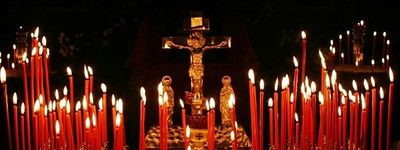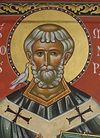

| Previous day | Next day |
| Old Style
March 12
|
Saturday |
New Style
March 25
|
|
4th Week of Great Lent. Fourth Saturday of Great Lent. Commemoration of the Dead.
Tone 7.
Great Lent. |
Wine and oil allowed.
|
![]() St. Theophanes the Confessor, of Sigriane (818).
St. Theophanes the Confessor, of Sigriane (818).
Righteous Phineas, grandson of Aaron (ca. 1500 b.c.). St. Gregory the Dialogist, pope of Rome (604). Sts. Symeon the New Theologian (1021), and his elder, Symeon the Reverent, of the Studion (987).
New Hieromartyr Vladimir (Volkov), archimandrite, of Islavskoe (Moscow) (1938).
Icon of the Most Holy Theotokos “Not-Made-by-Hands” (on the Pillar) at Lydda (1st c.).
Righteous Aaron the High Priest, brother of Prophet Moses the God-seer (ca. 1530 b.c.). St. Cyrus, monk, of Alexandria (6th c.). St. Paul Aurelian, bishop of Leon in Brittany (572). St. Alphege, bishop of Winchester, England (951). St. Nicodemus of Mammola in Calabria (990). Martyr Demetrius the Devoted, king of Georgia (1289). St. Dragutin (monk Theoctistus) of Serbia (1316).
Repose of Schemamonk Anthony the Gorge-dweller, of Zelenchug Monastery in Kuban (1908).
Thoughts for Each Day of the Year
According to the Daily Church Readings from the Word of God
By St. Theophan the Recluse

Saturday. [Heb. 6:9–12; Mark 7:31–37]
Flesh and blood cannot inherit the Kingdom of God (I Cor. 15:50). Consequently, to receive the kingdom it is necessary to become fleshless and bloodless—that is, to become steadfast in such a nature of life wherein blood and flesh literally do not exist. This is attained by a complete renunciation of deeds that come from flesh and blood. Now the works of the flesh are manifest, which are these; Adultery, fornication, uncleanness, lasciviousness, idolatry, witchcraft, hatred, variance, emulations, wrath, strife, seditions, heresies, envyings, murders, drunkenness, revellings, and such like. Having listed all of these, the Apostle adds: I tell you before, as I have also told you in time past, that they which do such things shall not inherit the Kingdom of God (Gal. 5:19–21). He that has ears to hear, let him hear (cf. Matt. 11:15)!
Articles
 Saturday of the Commemoration of the DeadSaturday of the Commemoration of the Dead |









